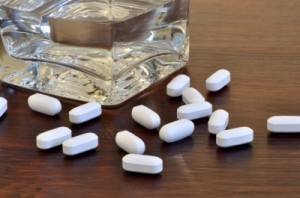What is Cross Addiction?

Many people, when first going to treatment and getting clean from their drug of choice (DOC) hear that they can no longer drink and think, “If I was addicted to pills, why can’t I drink?”
There’s something called having a cross addiction, which means that you are addicted to more than one substance at the same time or at different times in your life. In the second scenario, cross addiction means you’ve traded one addiction for another. Cross addiction happens in many different ways. For example, a heroin addict might start abusing alcohol, or someone recovering from alcoholism starts abusing painkillers.
Many cross-addicted people will use a substance that mimics their original addiction. For instance, a recovering cocaine addict may become addicted to prescription stimulants used to treat ADHD. Individuals with a cross addiction might also abuse seemingly innocent substances, such as over-the-counter sleep aids or prescription sedatives. Some even develop non-substance addictions to activities like excessive shopping, gambling, or sex.
It’s no surprise that many people in recovery wrestle with the problem because addiction is often defined as a chronic, relapsing disorder. This is because addiction has less to do with a substance and more to do with how our brains work. The way we learn to survive is based on a reward system. When we do something that aids in our survival, like eating or exercising, our brain’s limbic system rewards us for this behavior by releasing dopamine, a chemical that makes us feel good. Since we like the way we feel, we learn to repeat the behavior.
Different substances approach the limbic system, also called the reward center, in our brains in different ways, but all substances of abuse cause the brain to release high levels of dopamine. This release can be two to 10 times the amount our brain releases normally, giving the user a sense of a “rush” or “high.”
Because of this release and its impact on the brain’s reward center, users learn very quickly to use a substance or engage in an activity. They learn this in the same way they learn to eat or exercise, but even faster and with more intensity, since the release of dopamine is so much larger.
Whenever you engage in something pleasurable, whether it’s eating chocolate or snorting cocaine, your brain releases the “feel good” chemical dopamine. When you have an addiction, your brain begins to need that feeling. That need is what triggers cravings that drive you back to the substance or activity that made you feel so good. When you’re in recovery – even though the original substance is no longer in your body – your brain continues to desire that feeling. In other words, it wants a new drug or activity to give you that “high.” That’s when cross addiction can occur.
It might be innocent enough: you have to get routine dental work, like a root canal, after which the dentist prescribes you a narcotic for the pain. Let’s say your original drug of choice was alcohol so, you think taking this drug will not be an issue for you. Once you introduce that drug into your system, however, your brain lights up in the way it did when you were using your original drug of choice – alcohol. Suddenly, you start craving this new drug like you did the alcohol and the mental obsession begins. The same goes if you were a pill-popper and you think you can have a beer or two or a nightly glass of wine.
Addiction and more specifically, cross addiction, has less to do with a specific substance and more to do with our brains and the reward system within. By introducing a chemical, any chemical, we run the risk of opening Pandora’s Box all over again.
If you or a loved one has a cross addiction please call toll-free 1-888-672-4435
Sources:
http://science.howstuffworks.com/
